Will Windows 11 support more processors in the future? This is highly unlikely as these processor requirements stem from the ability to support enhanced privacy and security features within Windows 11.
According to Microsoft, Windows 11 is unlikely to guarantee support for the following processors: Intel processors: Generation 8 or later. (See all processors supported by Intel.AMD) Processors: Ryzen 2000 or later.
This is one of them and its base requirement is 1 GHz (GHz) or higher with 2 or more cores based on a compatible 64-bit processor or system on a chip (SoC). But not all CPUs that meet these minimum requirements can run Windows 11. Come see if your CPU is copied.
As mentioned above, Windows 11 is 52% more likely to experience kernel issues when running on older processors. This is due to the DCH design principles used by older processors, and therefore Microsoft had to make the decision to exclude those same processors from support for Windows 14.
Hey Van Schwank! It is very likely that Microsoft will not add older processors that will update compatibility with Windows 11. Although your own PC is not listed, this means that you will not be able to install Windows 11.
Why are ARM CPUs different from x86 CPUs?
Almost many combinations of bits mean something and an ARM processor and something else besides them, for x86. Because the sets of training programs are different. This is usually the reason why ARM processors use less power (and are therefore used in phones).
Does Windows 11 support more CPUs?
Will Windows 11 include more processors in the future? This is unlikely as these processors are based on the ability to support advanced privacy and security options in Windows 11.
Does Windows 11 support more cpus?
Will Windows 11 support many processors in the future? This is unlikely as these processor standards are based on the ability to support advanced privacy and security features in Windows 11.
Will Windows 11 support more CPUs in the future?
If successful, will Windows 88 support more processors? This is unlikely as the CPU requirements are related to being able to support Windows 11’s advanced privacy and security features. This allows Microsoft to maintain stability on the latest screws and bolts, but still fails to do so with the potential use of older processors.

Ermias is a tech writer with a passion for helping people solve Windows problems. He loves to write and share his knowledge with others in the hope that they can benefit from it. He’s been writing about technology and software since he was in college, and has been an avid Microsoft fan ever since he first used Windows 95.
